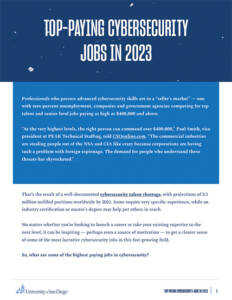Crucial to every organization, the role of the systems administrator is wide-ranging and varies considerably from one workplace to another. Bottom line: They’re the IT experts who are responsible for the day-to-day operations of the increasingly complex computer networks and electronic infrastructure that every organization depends on today.
This can include planning and setting up networks based on an organization’s unique requirements, and then maintaining, adapting and upgrading them as needed. The systems administrator role (often shortened to “sysadmin”) also continues to evolve; as increased reliance on the internet has brought increased risk, systems administrators are often responsible for overseeing or strengthening network security.
This article will examine systems administrator job responsibilities, salaries, career paths; education, certifications and training; and much more — including a closer look at how systems administration connects to the world of cybersecurity.
Systems Administrator Job Responsibilities
In many organizations, systems administrators are regarded as the in-house computer wizards, information technology jacks of all trades, often speaking a language that can sound foreign to colleagues who don’t understand IT but who are dependent on reliable, functioning systems to do their jobs.
Systems administrator job responsibilities may include:
- Designing, installing, configuring and maintaining servers and networks
- Overseeing system performance and troubleshooting issues
- Installing network hardware and software
- Implementing upgrades and repairs in a timely manner
- Resolving problems in response to user issues or automated alerts
- Adding and assigning users and network permissions
- Training users in proper use of hardware and software
- Developing and enforcing organizational IT policies
- Supervising lower-level IT staffers
- Collecting data to help evaluate and optimize performance
- Creating backups and safeguarding data
- Maintaining network and computer system security
Systems Administrator Salaries
The U.S. Bureau of Labor Statistics lists the median annual pay for Network and Computer Systems Administrators at $82,050. U.S. News & World Report ranks Computer Systems Administrator among the Best Technology Jobs, listing a median salary of $81,110, with the top 25 percent earning an average of $104,460. The report indicates that average salaries range higher in certain markets such as San Francisco ($111,420) and Baltimore ($109,050).
Systems Administrator Career Paths
With their comprehensive knowledge and experience, systems administrators have a variety of career pathways available to them. The following upper-level IT positions include brief job descriptions and salary data from U.S. News & World Report:
Computer Network Architect — $104,650: Computer network architects design, build and maintain a variety of data communication networks, from expansive cloud infrastructures to smaller intranets.
Information Technology Manager— $139,220: The guides who help organizations navigate the always-changing labyrinth that is modern technology.
Database Administrator — $87,020: Keeping a company’s data organized is a big job. Database administrators use software to store, sort and secure important information and help other workers access it as necessary.
Information Security Analyst — $95,510: The gatekeepers or security guards of information systems, these professionals plan and execute security measures to shield an organization’s computer systems and networks from infiltration and cyberattacks.
Systems Administrator Careers [Transitioning to Cybersecurity]
As network security, information security and cybersecurity continue to take on heightened importance during the Digital Age, transitioning into cybersecurity is an increasingly common career path for systems administrators and other IT professionals.
Cybersecurity professionals are in great demand now that a virtual epidemic of online crime is forcing companies to take a much more aggressive posture to protect their information assets from highly skilled hackers. As organizations continue to ramp up their defenses, a shortage of cybersecurity specialists who possess the needed skills and experience has presented challenges for employers and opportunities for seasoned IT pros.
“With 1.8 million unfilled global cybersecurity job openings by 2022, job hunters can often expect higher-than-average salaries than for similar IT jobs outside the security category,” according to CSOonline.com, a web publication that covers enterprise security and risk management issues.
The Cybersecurity Career Pathway page at CyberSeek.org lists the following job titles and average salaries:
Entry-level
- Incident Analyst/Responder — $99,000
- Cyber Crime Analyst/Investigator — $85,000
Mid-level
- Cybersecurity Analyst — $85,000
- Cybersecurity Consultant — $100,000
- Penetration & Vulnerability Tester — $102,000
Advanced-Level
- Cybersecurity Manager/Administrator — $115,000
- Cybersecurity Engineer — $108,000
- Cybersecurity Architect — $129,000
Senior executives in cybersecurity such as Chief Security Officer (CSO) or Chief Information Security Officer (CISO) can earn well over $200,000, with CISO salaries as high as $380,000 in the San Francisco area.
[RELATED] Chief Security Officer — High Demand, ‘Skyrocketing’ Pay for CSOs
Additional roles include security administrator, security engineer, security architect, penetration tester/ethical hacker and more.
System Administrator Certifications
Among numerous certification opportunities available to systems administrators, these are among the best, according to Business News Daily, which cites CompTIA Server+ as “the clear favorite.”
- CompTIA Server+
- Microsoft Certified Solutions Expert (MCSE)
- VMware Certified Professional – Data Center Virtualization (VCP-DCV and VCP6.5-DCV)
- Red Hat Certified System Administrator (RHCSA) and Certified Engineer (RHCE)
Cybersecurity Certifications
“Every information technology position is also a cybersecurity position now. Every IT worker, every technology worker, needs to be involved with protecting and defending apps, data, devices, infrastructure and people,” according to Cybersecurity Ventures, which describes CompTIA Security+ as “the first security certification IT professionals should earn.”
Additional highly regarded cybersecurity certifications include:
- Certified Ethical Hacker (CEH)
- Certified Information Systems Auditor (CISA), Certified in Risk and Information Systems Control (CRISC) and Certified Information Security Manager (CISM)
- Certified Information Systems Security Professional (CISSP)
- Certified Information Privacy Professional/US (CIPP/US)
- Cisco Certified Network Associate Security (CCNA) and Cisco Certified Network Professional Security (CCNP)
- Computer Hacking Forensics Investigator (C|HFI)
- GIAC Security Essentials (GSEC)
Cybersecurity Educational Opportunities
The increasing demand for cybersecurity professionals has also resulted in more colleges and universities offering bachelor’s and master’s degree programs — both on-campus and online.
Systems administrators who are considering earning their master’s degree in cybersecurity are likely motivated by one of several reasons:
- To become better systems administrators by expanding their knowledge and skills in the increasingly essential area of information security and cybersecurity
- To leverage their system administrator skills and experience to transition into or specialize in the fast-growing cybersecurity field
- Increased job security, now that organizations across all industries need cybersecurity professionals to safeguard data and information assets from highly skilled adversaries
Robert Herjavec, a high-profile cybersecurity executive (founder and CEO of Herjavec Group) who also appears on the ABC’s “Shark Tank,” asserts that people who are drawn to the field are also motivated by opportunity to do good, emphasizing the role of cybersecurity professionals as crime fighters.
“We’re fighting bad guys. The online world is the Wild West and there is no sheriff,” Herjavec says in a video interview with Cybercrime Magazine. And with high stakes and high demand having created “zero percent unemployment,” he says. “If you know cybersecurity, you have a guaranteed job for life.”
What Are Some Other Top Cybersecurity Careers?
Cybersecurity is a fast-growing, high-paying field with a range of different types of job openings. Which role might be ideal for you? Take a moment to explore some of the other exciting careers in cybersecurity:
Chief Information Security Officer (CISO)
Want to see the top paying jobs in cybersecurity? Read this article.
Want to see the top entry level jobs in cybersecurity? Read this article.
Want to see the top non-technical jobs in cybersecurity? Read this article.
Want to learn how to land the best jobs in cybersecurity? Read this article.





